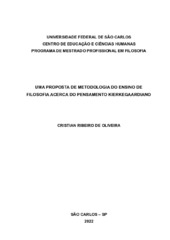| dc.contributor.author | Oliveira, Cristian Ribeiro de | |
| dc.date.accessioned | 2022-11-07T14:29:01Z | |
| dc.date.available | 2022-11-07T14:29:01Z | |
| dc.date.issued | 2022-10-24 | |
| dc.identifier.citation | OLIVEIRA, Cristian Ribeiro de. Uma proposta de metodologia do ensino de filosofia acerca do pensamento kierkegaardiano. 2022. Dissertação (Mestrado em Filosofia) – Universidade Federal de São Carlos, São Carlos, 2022. Disponível em: https://repositorio.ufscar.br/handle/ufscar/16988. | * |
| dc.identifier.uri | https://repositorio.ufscar.br/handle/ufscar/16988 | |
| dc.description.abstract | To develop a critical, creative and autonomous citizen based on reflective
thinking, this is the challenge that we propose in the present work, following the
Kierkegaardian philosophy and seeking to dialogue with premises that encompass the
existentialist philosophy and passing with considerable emphasis on the pedagogy of
Paulo Freire. We chose to face the challenge of thinking about an education that aims
at the construction and effectiveness of subjectivity in a process of humanization of the
individual, where the edification must happen inside each existing one in the midst of
its relationship with the world. We were able to achieve our goals, namely, to think
about the possibility of working with Kierkegaardian thinking on the ground of the
Brazilian basic education classroom, promoting constant dialogue with the
contemporary educational urgency that should promote a critical awakening in the
student class through existential philosophy. Within this conception, the impossibility
of impartial education was proved, given that the educator must take a stand on the
difficult task of being both a master and an apprentice. To think about an education
that really has an effective commitment to the subjectivity of each existing, with the
ethical transformation of society and the edification of people. Finally, the present work
evokes the need to think about an education that has as its main objective the
construction of authenticity and, consequently, the development of a critical, ethical
and political conscience of people, allowing them to understand the possibility they
have to change the directions of society and thus create culture. | eng |
| dc.description.sponsorship | Coordenação de Aperfeiçoamento de Pessoal de Nível Superior (CAPES) | por |
| dc.language.iso | por | por |
| dc.publisher | Universidade Federal de São Carlos | por |
| dc.rights | Attribution-NonCommercial-NoDerivs 3.0 Brazil | * |
| dc.rights.uri | http://creativecommons.org/licenses/by-nc-nd/3.0/br/ | * |
| dc.subject | Filosofia | por |
| dc.subject | Ensino médio | por |
| dc.subject | Professor | por |
| dc.subject | Existencialismo | por |
| dc.subject | Philosophy | eng |
| dc.subject | High school | eng |
| dc.subject | Teacher | eng |
| dc.subject | Existentialism | eng |
| dc.title | Uma proposta de metodologia do ensino de filosofia acerca do pensamento kierkegaardiano | por |
| dc.title.alternative | A proposal for a methodology for teaching philosophy about Kierkegaardian thought | eng |
| dc.type | Dissertação | por |
| dc.contributor.advisor1 | Maamari, Adriana Mattar | |
| dc.contributor.advisor1Lattes | http://lattes.cnpq.br/5707827597161294 | por |
| dc.description.resumo | Desenvolver um discente crítico, criativo e autônomo a partir do pensar reflexivo,
eis o desafio que nos propomos no presente trabalho trilhando pela filosofia
kierkegaardiana, buscando dialogar com premissas que engloba a filosofia
existencialista e passando, com considerável destaque, pela pedagogia de Paulo
Freire, almejando demonstrar congruência entre o filosofo dinamarquês e o pensador
brasileiro. Escolhemos encarar o desafio de pensar uma educação que visa a
construção e efetivação da subjetividade em um processo de humanização do
indivíduo, onde a edificação deve acontecer no interior de cada existente em meio a
sua relação com o mundo. Conseguimos atingir nossos objetivos, a saber, pensar na
possibilidade de se trabalhar o pensamento kierkegaardiano no solo da sala da
educação básica brasileira promovendo constante diálogo com a urgência
contemporânea educacional que deve promover um despertar crítico na classe
discente através da filosofia existencial. Dentro desta concepção provou-se a
impossibilidade de uma educação imparcial, haja vista que o educador deve
posicionar-se diante da difícil tarefa de ser ao mesmo tempo mestre e aprendiz. Para
pensar uma educação que realmente tenha um compromisso efetivo com a
subjetividade de cada existente, com a transformação ética da sociedade e a
edificação das pessoas. Por fim, o presente trabalho evoca a necessidade de pensar
uma educação que tenha como objetivo maior a construção da autenticidade e
consequentemente o desenvolvimento de uma consciência crítica, ética e política das
pessoas, permitindo-lhes a compreensão da possibilidade que têm de modificar os
rumos da sociedade e dessa forma criar cultura. | por |
| dc.publisher.initials | UFSCar | por |
| dc.publisher.program | Programa de Pós-Graduação Profissional em Filosofia - PROF-FILO | por |
| dc.subject.cnpq | CIENCIAS HUMANAS::EDUCACAO::ENSINO-APRENDIZAGEM | por |
| dc.subject.cnpq | CIENCIAS HUMANAS::FILOSOFIA::EPISTEMOLOGIA | por |
| dc.subject.cnpq | CIENCIAS HUMANAS::FILOSOFIA::ETICA | por |
| dc.description.sponsorshipId | 5779759 | por |
| dc.publisher.address | Câmpus São Carlos | por |
| dc.contributor.authorlattes | http://lattes.cnpq.br/9853505003458683 | por |


